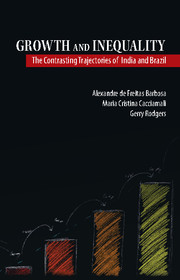Book contents
- Frontmatter
- Contents
- List of Tables
- List of Graphs and Maps
- Preface and Acknowledgements
- List of Abbreviations
- 1 Brazil and India: A Mirror Image of Each Other?
- 2 Approach and Method
- 3 Brazil and India in the Decades before 1980
- 4 India and Brazil from 1980 until 2014
- 5 Key Divides and Cleavages: Ruptures, Continuities, or Adaptation?
- 6 Inequality in Social and Economic Context
- 7 Post-Script
- Bibliography
- Index
Preface and Acknowledgements
Published online by Cambridge University Press: 02 August 2019
- Frontmatter
- Contents
- List of Tables
- List of Graphs and Maps
- Preface and Acknowledgements
- List of Abbreviations
- 1 Brazil and India: A Mirror Image of Each Other?
- 2 Approach and Method
- 3 Brazil and India in the Decades before 1980
- 4 India and Brazil from 1980 until 2014
- 5 Key Divides and Cleavages: Ruptures, Continuities, or Adaptation?
- 6 Inequality in Social and Economic Context
- 7 Post-Script
- Bibliography
- Index
Summary
This book presents the main results of a research project that was undertaken at the Brazilian Centre for Analysis and Planning, São Paulo, Brazil (CEBRAP) and at the Institute for Human Development, New Delhi, India (IHD), with the financial support of the International Development Research Centre, Canada (IDRC, grant 106919). The project aimed to better understand the factors shaping labour market inequality in India and Brazil, on the basis of a comparison of the experiences of the two countries, and to inform policies that might lead to its reduction. It also aimed to contribute to the development of methods of comparative research on labour market issues, drawing on the intellectual traditions in the two countries, and to strengthen research collaboration across countries of the South.
This is a long term study of a subject that is always in the political spotlight. As we write, both countries are undergoing substantial change, as new governments reverse earlier policies and introduce new initiatives. We take note of some recent developments in the last chapter, but this is a never-ending story. We do not have a crystal ball and do not try to second-guess the outcomes of current debates. Our argument is rather that positions and actions today have to be understood in historical context. Economic structures and social institutions change slowly, and the patterns observed in the past provide lessons for the future, and help build a critical perspective on political claims and arguments.
Further results from this research can be found in publications listed in the references at the end of the book. These include papers on data sources and research approaches in the two countries, policy papers on minimum wages and on training systems, lectures, presentations, and more detailed quantitative papers and monographs. While this book is a comparative study of Brazil and India, the research was also based on more detailed studies of each country.
This was a team effort in which many people made important contributions.
- Type
- Chapter
- Information
- Growth and InequalityThe Contrasting Trajectories of India and Brazil, pp. xvii - xxPublisher: Cambridge University PressPrint publication year: 2017



